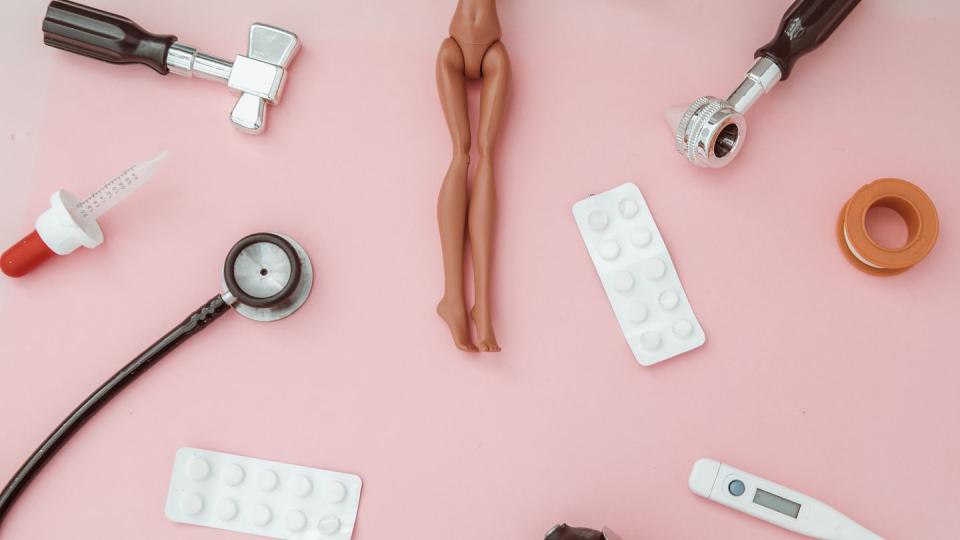How Come No One Told Me Getting Pregnant Would Be This Hard?

It was 2004 and all the cool girls in my Arizona middle school were wearing Abercrombie miniskirts. I was sitting with the other 7th graders in a science classroom, attempting to avoid eye contact when the sex-ed instructor slapped one hand on top of the other and sternly warned us that genital warts could “stack like pancakes.” My face flushed. The instructor proceeded to take us through a brief description of puberty and menstruation, a quick-and-dirty primer on sex and pregnancy, and a deeply detailed monologue on sexually transmitted diseases, with pictures of gonorrhea and herpes enlarged and projected on the wall. I walked out of the classroom embarrassed but armed with what felt like new, hard-won knowledge: It was my job, I understood, to be on guard against sex and disease and pregnancy. If I lost my focus, I, too, would be lost and it would be all my fault.
My body was a mystery to me well into adolescence. I knew I bled every month, but I wasn’t sure why. I figured the first time I had sex would be painful because my hymen would break (wouldn’t it?), but I didn’t quite know what a hymen was, or how I would know if it was broken. I knew sex could lead to pregnancy, but I couldn’t have described what insemination or ovulation were exactly. The mechanics of menstruation, sex, and pregnancy were mystifying to me and so many other young women whose formal instruction of our own bodies began and ended with the directive to avoid getting pregnant (or catching the forewarned genital pancakes) at all costs.
The confusion lasted into my early 20s—did a condom breaking mean my friend would get pregnant even if her boyfriend pulled out? Was the risk high enough to justify the expensive purchase of Plan B? Could you get pregnant from pre-cum? Was pre-cum even real? Were female orgasms real? Was squirting actually peeing? Was sex supposed to hurt? What did it mean if my period was early? How scared should we be? We were so confused—right up until some of us started to think about getting pregnant on purpose.
And then, of course, after a lifetime of trying to skirt the worst possible fate, we were supposed to switch tracks and drop our defenses in order to procreate (preferably while married, preferably to a man, of course). But the realities of fertility and pregnancy are extremely complex—and with a lack of foundational knowledge, it can be an entirely overwhelming process.
Before I started contemplating motherhood near the end of my 20s, I didn’t know, for instance, that the odds of getting pregnant each month are about 20 percent for someone my age. Or that there are only a handful of days each month when conception is even possible. Or that pinpointing your ovulation window can be a complicated confluence of taking your temperature, checking your cervical mucus, and dipping little plastic strips into your urine (yes, an experience as enjoyable as it sounds). And even if you do manage to get pregnant, it’s estimated that about 10 to 20 percent of pregnancies end in miscarriage.
So many women, judging by my group chats and the subreddits where I lurk, are puzzling their way through this baffling transition, without any real or comprehensive guidance. On apps meant to help women on their path to pregnancy, the discussion boards overflow with elaborate questions about cycles and tracking and when to have sex. Anonymous posters who are struggling to conceive often wonder if this mind-bending, arduous, stressful undertaking—the "simple" act of having a baby—is normal.
Melissa Monaghan, 39, thought getting pregnant would be a breeze. She stopped taking birth control and started tracking her menstrual cycles. After her first pregnancy ended in miscarriage, she became obsessed with getting pregnant again. “We tried on our own for eight more months,” she said. “It was miserable. It was just too much pressure.” And beneath the pressure was an undercurrent of shame: This was her fault. Wasn’t this supposed to be easy? Before she and her husband started trying to conceive, Melissa had no idea that most people can only get pregnant during a narrow ovulation window every month. When a doctor advised her to notice the changes in her cervical discharge, which can become stickier in consistency during ovulation, Melissa wondered why she had never noticed it before.
“I didn’t know the functions of the body,” she says, remembering the starkly abstinence-based sex education she received where she grew up in Alabama. “I was always told, ‘It’s so easy to get pregnant, so don’t have sex.’ But then it messes you up later because you get older and you’re trying to get pregnant and you’re like, ‘I’m a freak. What’s wrong with me?’”
Although she eventually started fertility treatments and had two daughters, the embarrassment she felt about not being able to have a baby made her wait longer to see a specialist. She couldn’t get past the first lessons she had ever learned about pregnancy: that it would happen without hurdles. When it was hard, she felt like a failure.

It’s rage-inducing that so many women are unaware of the intricate realities of their own bodies until they're trying to conceive—at which point, it's on you to figure out, pretty much all by yourself. (Good luck!) What does it say about the way society views girls that this knowledge is considered extraneous—dangerous, even—until it can be used to procreate? The misogyny in this message is staggering: Our bodies—and by extension, ourselves—are useful only for reproduction. We don’t need to know what’s happening inside us, except when we are given enough knowledge to either protect against pregnancy or pursue it. In the first part of our lives, we are responsible for avoiding pregnancy and in the second part, we’re pressured to achieve it. Either way, pregnancy (even a hypothetical one) is the center around which a woman’s life revolves. It’s exclusively and entirely our problem.
Andréa Becker, a postdoctoral researcher who studies sexual and reproductive health at the University of California at San Francisco, said much of contemporary sex education is predicated on a mistrust of women and girls, as if arming them with the relevant information will lead to catastrophe (imagine it: women and girls taking full, informed ownership of their sexualities). “It leads to a lot of fear and anxiety during sex, even before women want to get pregnant,” she said. “I think that’s intentional and part of the slut-shaming of women in general.”
It’s not a coincidence that my friends who are already mothers are the ones who know their bodies most intimately. They had to learn. But why is motherhood or the desire for it a requisite for that self-knowledge?
It wasn’t until Abbe Wright, 38, was trying to conceive that she really understood her reproductive system, from menstruation and ovulation to fluctuating hormones and the function of fallopian tubes. “We’re actually not prepared at all to deal with what it means to occupy a woman’s body in the world,” she says. “When it comes time to understand what the fuck is going on down there, it’s like, ‘Nope, sorry, you’re on your own.’”
And it can feel lonely. For so long, Abbe felt the burden of not getting pregnant was hers to bear because she was the one to take birth control or make sure her partner wore a condom. The weight of getting pregnant inevitably feels like it’s hers, too. Even with a supportive partner, she has to take her temperature every morning to pinpoint her fertility window, pee in a cup for ovulation strips, and monitor her body for any possible changes. “We’ve been fed this narrative that if you uncross your legs the wrong way, it’ll happen to you.” But the reality—thermometers and test strips and calendars—is far from what we are warned about when we are young: that pregnancy will happen simply and naturally unless we actively take measures to prevent it.
Going to Catholic school growing up, L’Oreal Thomas Payton, 35, says the fear of God was put in her about sex and pregnancy. Looking at a boy sideways, she remembers, felt like it could derail her life. “It’s like we were lied to,” she says. “You don’t know how hard it is to get pregnant until you start trying.” L’Oreal thinks back to her early days of trying to conceive and calls herself naive. She wondered if her history of fibroids—tumors that grow on the wall of the uterus—affected her fertility. Even as her friends and family assured her they had conceived easily and without testing, her reality was so far from theirs. “I turned getting pregnant into a second job,” Payton says. “People would just tell me to relax and I wanted to punch them in the face. It’s a total disregard for your feelings.” She found solace in online groups where other women frankly discussed their own difficulties and she could share her own: the disappointment, doctors' appointments, and fertility treatments that eventually led her to motherhood.
Every once in a while, my friends and I think back to that 7th grade sex-ed class and laugh, but when I linger on it for more than a minute, I am full of fury. Almost 20 years after I averted my eyes from close-up photos of herpes sores while my legs stuck to the hot plastic of my seat, Arizona still has an abstinence-based sex-ed curriculum. There is no federal law dictating sex education requirements, while states like Texas, Oklahoma, and Florida are moving to limit instruction even further.
This is happening as women’s constitutional right to abortion has been revoked and the maternal mortality rate in the United States is dramatically higher than other high-income countries, with Black women disproportionately affected. I wish I could find that first awkward sex-ed experience funny, instead of now seeing it for what it was: a symptom of a society that’s terrified of women’s sexuality and a harbinger of the decades I would spend hunting for answers about my own body, looking to other confused young women for help.
I wonder how life would be different if we actually did trust women and girls to make informed decisions about their own bodies. Would sex ed still be one rushed seminar delivered to scared (and to scare) 12-year-olds? Would our health care system continue to be an expensive vortex of bureaucratic horrors and surprise bills as women attempt to navigate fertility (or any number of reproductive issues) on their own? What anxieties could be soothed if we really tried? How many nights could we sleep easier? I want to be a mom, but I shouldn't have to spend hours of my own time, cobbling together information from friends, strangers in online forums, and #fertilityjourney TikTok videos, to understand something so fundmanetal about my own body. I deserve to know this independent of my personal desire for motherhood. We all do.
You Might Also Like

